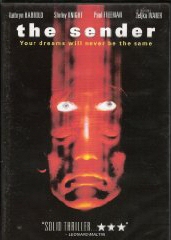
A half-hearted attempt at cashing in on psychic phenomena and supernatural horror, The Sender fails as both a drama or a shocker. Unable to find its own voice or a clear purpose, the story is simply too loosely knit to engage our interest in events. The narrative is scattered around a few memorable key images, having neither the heart or intellectual curiosity required to evoke suspense or even basic shock. While the script features a ghost, religious innuendos, and a heaping of psychic fantasy, the direction focuses on none of these with intensity or intelligence, more concerned with milking the soap opera elements. Roger Christian's first feature film, The Sender displays his skill at creating disturbing set pieces. But without an emotional center to weave these elements together, such bloody treats as severed heads and bleeding mirrors remain only stage tricks.
After a young man tries to drown himself, he is put in the care of Gail Farmer, a psychiatric doctor married to her work. The man has no identification and is unable to remember who he was or why he should wish to die. As Dr. Farmer attempts to discover John Doe's identity and make some emotional connection with him, she begins to experience nightly hallucinations which soon turn deadly. At one point she sees John wandering through her house and calls the police only to find nothing has been disturbed and that her patient is safely tucked away at the hospital for the night. The strange sightings continue until the good doctor discovers that John communicates, perhaps subconsciously, his private thoughts and fears through a destructive form of telepathy. One day John's mother arrives at the hospital, wishing to take her boy home. This woman is clearly unsettling and seems to disappear as soon as Dr. Farmer turns around. Between John's increasingly violent episodes and the danger they place both patients and staff in, Dr. Farmer begins to question her own sanity. Events take a more eerie tone when it's discovered that John's mother is dead. As further inexplicable paranormal events occur in the hospital, Dr. Farmer begins to question just how innocent her young charge is . . .
Director Roger Christian won an Oscar for set direction on both Star Wars and Alien. His eye for detail and set believability is displayed in this psychological thriller. Sterile hospitals, isolated cabins, and a feeling of atmospheric hopelessness are all used to fine effect. If the general theme of the film, and the structure of the plot, had been as lovingly developed, the movie would be worth more than just a one-time glimpse. As it is, characters are more caricatures than living, breathing personas, and the routine acting gives us little reason to connect with them. One of the more effective plot elements is the macabre presence and cold amorality of John's mother. Her presence brings a slight echo of fright into an otherwise uneven drama but, in the end, can do little to liven up what for all intents and purposes feels like a Lifetime Movie. While a certain degree of ambiguity is often required to evoke true dread and wonder in a supernatural story, a basic line of interest/explanation should be maintained between the audience and characters. Here we have several enigmatic story twists -- the boy's basic character/identity, why his mother tried to kill him, paranormal abilities -- without any unifying structure. To further complicate maters, we're teased half way through the script when introduced to the concept of a baby able to telepathically communicate with his mother without the writers following it up with any real depth. It is simply thrown out there along with a half dozen other ideas, leaving the effective if sparse moments of gory spectacle the only truly frightening moments on screen -- moments that are just that, unconnected glimpses of surrealism. This is an occasionally interesting if ultimately disappointing effort.
Legend films presents this contradictory and confused thriller in a wonderfully sharp and professional print. Featured in anamorphic 1.85:1 widescreen, the print is free from grain . The colors are bright and crisp, skin tones realistic. The Mono English track is clean and understandable if occasionally uneven during the more fantastic scenes. No extras are included.
Review by William Simmons
| Released by Legend Films |
| Region 1 - NTSC |
| Not Rated |
| Extras : |
| see main review |